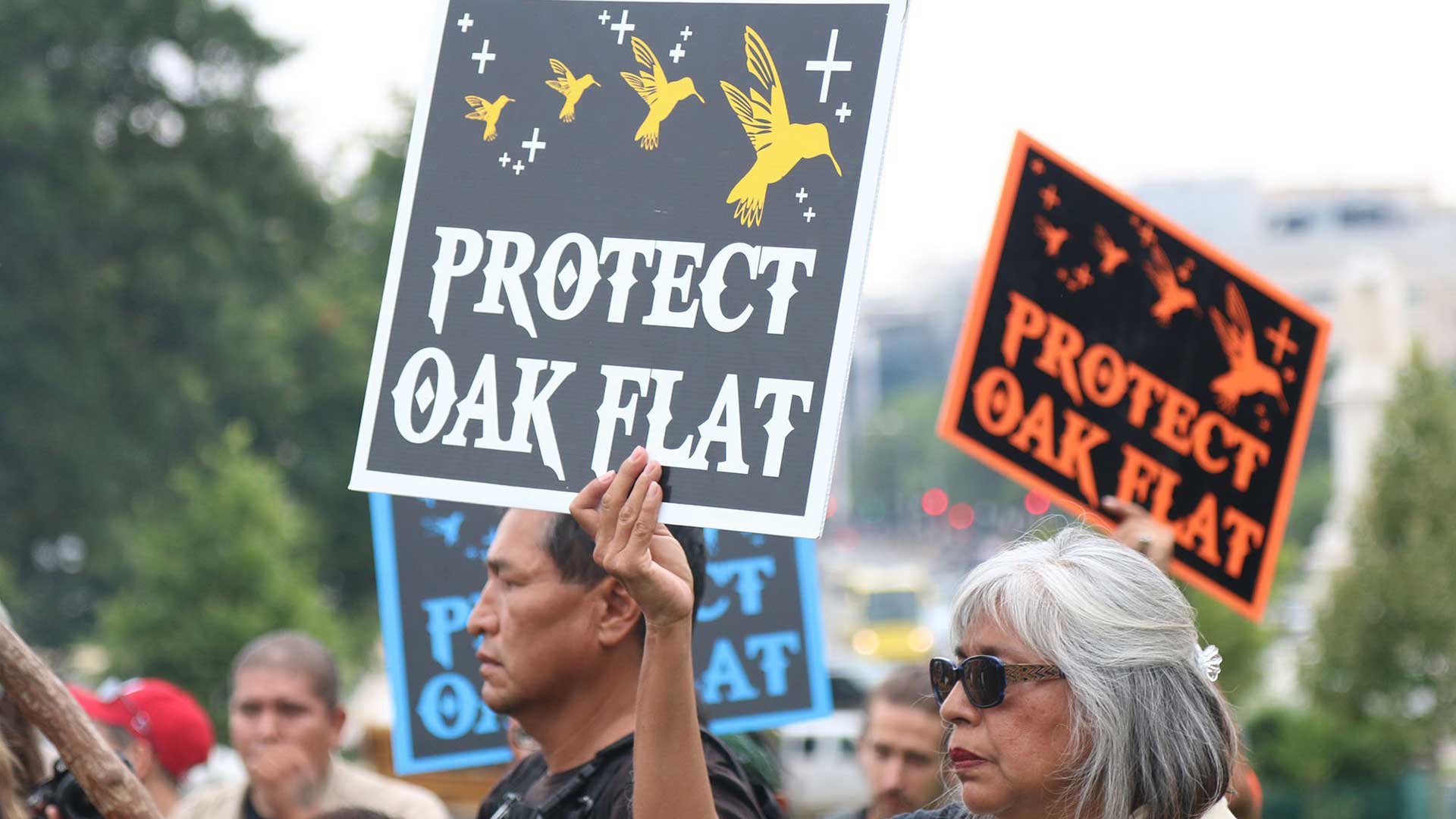 Protests against the Resolution Copper mine near Oak Flat have been going for years, as shown in this 2015 file photo from a rally at the Capitol.
Protests against the Resolution Copper mine near Oak Flat have been going for years, as shown in this 2015 file photo from a rally at the Capitol.
A federal judge has denied the San Carlos Apache Tribe’s and environmental groups’ efforts to block the transfer of sacred Apache land to a foreign-owned copper mining venture.
The fight over Oak Flat began after Congress tucked the Southeast Arizona Land Exchange and Conservation Act into a national defense funding bill in 2014. The law, led by the late Republican Senator John McCain, requires the U.S. Forest Service to transfer Oak Flat to Resolution Copper in exchange for other parcels.
However, Western Apaches have worshipped at Oak Flat since time immemorial, conducting coming-of-age ceremonies and gathering plants necessary for religious practices. Tribal members believe the site is inhabited by Ga’an, or holy spirits, and serves as a direct spiritual link to their Creator.
Despite its religious importance, the push to mine what is believed to be one of the world’s largest copper deposits continues. The controversial mine would eventually leave a nearly two-mile-wide crater and over one thousand feet deep.
“The bill that authorized the land exchange is not in the best interest of the American people, Arizona or the San Carlos Apache Tribe,” San Carlos Apache Tribe Chairman Rambler said. “We have filed this lawsuit because of our concerns of the mine’s massive use of groundwater, which will be devastating for both Arizona and eventually the Tribe. We are also deeply concerned about the environmental destruction and the obliteration of Oak Flat will have on Apache culture and religion.”
The judge said the group’s challenge was premature, since a new environmental review has not been published yet. Federal law requires a final environmental impact statement before such swaps may take place. Those inquiries review how mining would affect the land.
The last environmental review was in 2021, but at the time, the U.S. Department of Agriculture directed the U.S. Forest Service to rescind it to “reinitiate consultation with Tribes and ensure impacts have been fully analyzed.” The new and final statement is expected to be released as soon as next week.
But, in Monday’s order, the court did block the U.S. Forest Service from finalizing the land swap until 60 days after that review is released, giving tribes time to revise their lawsuits.
The federal government and the mining company agreed to the 60-day delay during a recent hearing. That timeline is also outlined in the 2014 legislation that authorized the land exchange.
The San Carlos Apache Tribe welcomed Judge Dominic Lanza’s ruling.
“We are grateful that Judge Lanza has provided us an opportunity to be heard,” Rambler said. “The two-month window provides the Tribe an opportunity to file an amended lawsuit challenging the legality of the pending environmental report and request an injunction to stop the land exchange until the merits of our case are settled.”
Despite the injunction’s denial, environmental activist groups like the Center for Biological Diversity also celebrated the judge’s preclusion.
“It's a tremendous relief that the court will prevent this terrible land exchange from taking place until we have the opportunity to review the Forest Service’s analysis and seek a more extended injunction,” Marc Fink, the director of the Public Lands Law Center at the Center for Biological Diversity, said. “The Trump administration has been rushing to sell out our public lands and destroy sacred sites and the environment. We look forward to having our day in court to defend Oak Flat based on a full record.”
The earliest the land may be conveyed is August 19. The Tribe and environmental groups have until July 14 to submit amended complaints. The court anticipates issuing a decision before the August 19 deadline.

By submitting your comments, you hereby give AZPM the right to post your comments and potentially use them in any other form of media operated by this institution.